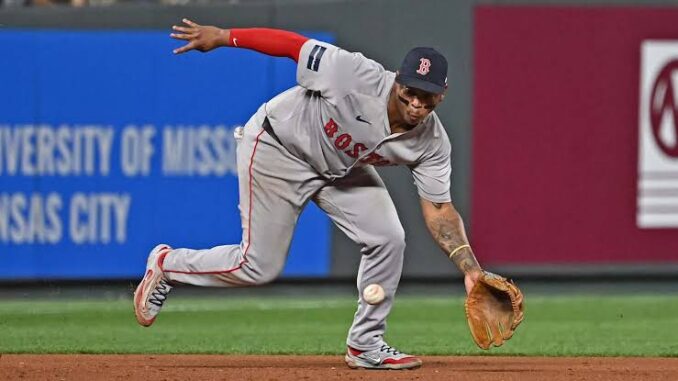
**Rafael Devers Anticipated to Embrace Third Base Demotion: Insights from a Rival Executive**
In the world of Major League Baseball, the dynamics of player roles and positions are critical in shaping the success of a team. This past season, the Boston Red Sox have found themselves in a situation that raises questions about one of their most valuable assets: Rafael Devers. Known for his dynamic hitting and powerful presence at the plate, Devers has been a cornerstone of the Red Sox lineup. However, recent discussions among executives suggest that a potential demotion to third base could be on the horizon. A rival executive has notably predicted that Devers would accept this change gracefully, signaling both an understanding of team needs and the player’s evolving role in the league.
**Devers: A Rising Star**
Rafael Devers, just 26, has emerged as one of the brightest stars in MLB. Since making his debut in 2017, he has consistently improved his game. Devers has demonstrated an ability to hit for both average and power, with 2021 marking his breakout season—where he earned his first All-Star selection and batted .279 with 38 home runs and 113 RBIs. His presence in the lineup has made him a player that opposing pitchers fear, and for good reason; Devers has a keen eye for the ball and the bat speed to turn seemingly ordinary pitches into extra-base hits.
As the Red Sox navigate through the complexities of their roster, the question arises: How will the organization handle Devers’ position amid emerging talent and existing needs?
**The Demotion Debate**
In recent months, the Red Sox have seen the emergence of several young talents, particularly in the infield. Names like Triston Casas and Jarren Duran are beginning to reshape the landscape of the team’s future. With these players pushing for more significant roles, some speculate that Devers might see a shift back to third base—a position he successfully occupied before his experimentation as a more versatile player.
The rationale behind this potential demotion lies in strategy. The Red Sox are more than just a team; they are a brand with a storied history, immense fan expectations, and a focus on winning. The changes in the game, particularly in player versatility and defensive alignments, have compelled teams to think strategically about positioning. For Devers, a move back to third could alleviate pressure from the team while allowing him to concentrate on elevating his performance at the plate.
**Time to Adjust**
A rival executive’s insight into the situation shines a light on the expected reaction from Devers. It’s not uncommon for star players to have a difficult time adjusting to a perceived demotion. Many players view a change in roles as a step back, a sign of diminishing importance. However, the rival executive believes that Devers will approach the shift with resilience and maturity. He understands that in a team sport, personal accolades are secondary to collective success.
Devers has always shown a willingness to improve his game, both offensively and defensively. His dedication to training and honing his skills suggests that he has the mentality to accept and adapt to his new role. The executive pointed out that he would likely view this as an opportunity to refine his craft and potentially extend his career by focusing on a specific position rather than trying to play multiple roles.
**Building a Winning Mindset**
It’s no secret that the Red Sox have lofty ambitions for their franchise. After several seasons of ups and downs, the focus is on establishing a culture of winning. For this culture to thrive, players must be willing to make personal sacrifices for the collective good. A player like Devers, with his significant resume and respect within the clubhouse, must embrace this attitude to set a positive example for younger teammates.
Moreover, embracing a demotion may also signal a maturity that Devers has demonstrated over the years. The executive noted that those who adapt are often rewarded in unforeseen ways. A focused Devers, concentrating on offense while shoring up the infield, could lead to an enhanced performance reflected in his stats. As a third baseman, he has the potential to regain an edge on defense while creating a seamless synergy with his infield teammates.
**Looking Ahead**
If indeed this demotion occurs, the Red Sox should expect Rafael Devers to approach the change head-on. His acceptance could enrich not only his game, but also improve his teammates’ dynamics. With a deep understanding of the game and a desire to contribute to team success, Devers could emerge as a national leader for the franchise.
In conclusion, the insights from a rival executive reveal a nuanced understanding of how the game is evolving, especially regarding player positions. Rafael Devers is not just a talented player; he’s becoming a crucial element in the Red Sox’s strategic future. His adaptability, resilience, and willingness to embrace change may prove to be invaluable assets as the team aims for championships in the coming years. As the Red Sox prepare for the next chapter, all eyes will be on Devers to see how he navigates this transition, ultimately shaping the team’s success in a highly competitive landscape.
Leave a Reply